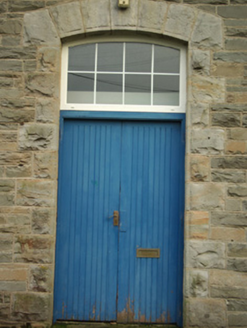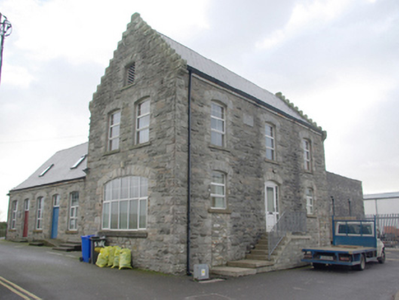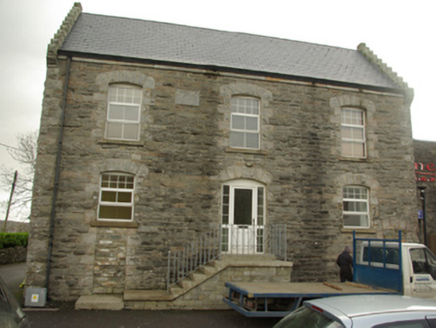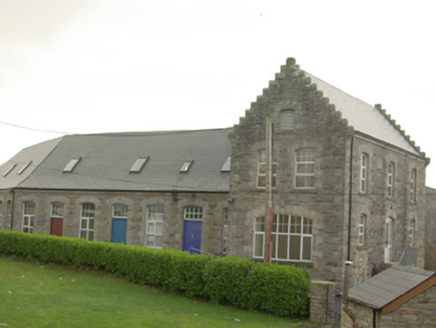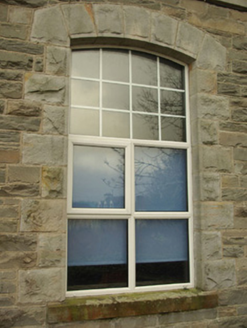Survey Data
Reg No
40845002
Rating
Regional
Categories of Special Interest
Architectural, Historical
Previous Name
Donegal Carpets
Original Use
Factory
In Use As
Heritage centre/interpretative centre
Date
1890 - 1910
Coordinates
171211, 376456
Date Recorded
05/12/2007
Date Updated
--/--/--
Description
Detached former carpet factory, dated 1900, comprising single-storey with attic level and two-storey former factory with three-bay two-storey office/administration block to the north-west corner. Various multi-period and modern extensions (including apartments) to the rear (south). Now in use as a heritage centre, business units, community enterprises units and as accommodation (apartments). Part of building still in use as a carpet factory. Pitched artificial slate roof to former factory; pitched roof to former factory office/administration block having artificial slate roof, cut stone eaves course, profiled cast-iron rainwater goods, crow-stepped parapets with rock-faced stone masonry, and having cut stone kneeler stones to gable ends at eaves. Roughly dressed and squared coursed rubble stone walls with flush dressed mildly rock-faced block-and-start quoins to the corners. Cement rendered walls to the rear elevation (south) and east side elevation of former factory. Cut stone date plaque to the west elevation of former office, dated 1900. Shallow segmental-headed window and door openings having flush mildly rock-faced block-and-start surrounds and with replacement window and door fittings. Cut stone sills surviving to some window openings. Number of window openings now elongated to form door openings; some door openings now partially infilled to form window openings. Shallow segmental-headed openings to gable ends of former office at attic level with flush mildly rock-faced block-and-start surrounds and timber louvers. Shallow segmental-headed carriage-arch to the north elevation of former office, now infilled to form window opening, having mildly rock-faced voussoirs over. Set back from road in extensive grounds with carparks etc. to the south-west of the centre of Killybegs.
Appraisal
Despite alterations and conversion to new uses, this substantial former factory retains some of its early form and character. The original structure is well-built using good quality masonry and retains robust rock-faced block-and-start surrounds to the openings that help give this building an imposing appearance. Of particular note is the two-storey former office/administration/showroom block to the north-west corner which has crow-stepped parapets to the gable ends that are vaguely reminiscent of the Scottish Baronial architectural idiom. This large-scale building was originally built as the Donegal Carpet factory. The company was founded by the Scottish textile manufacturer Alexander Morton (1844 – 1923) in 1898, and perhaps the crow-stepped gables are an architectural reference to his Scottish roots. Morton himself supervised the building works. The company was supported in its initiation by the Congested Districts Board, who later funded the construction of three more carpet factories for Morton at Kilcar (1899), Anagry (1904) and at Crolly (1904). The Killybegs factory remained the most important, and it was here that spinning and dyeing was done for the entire company. The other three factories later closed during the Great Depression in the 1930s. The Morton factories produced hand-woven carpets in a ‘Turkish’ style, and the work produced became world-famous during the first decades of the twentieth century. Many of these carpets were produced on what is apparently the largest longest hand-knotting loom (forty-two feet wide) in the world, which can still be seen to the interior of this factory in Killybegs. Carpets made by the Morton company (popularly known as ‘Donegals’) were created mainly by local woman, and many were produced to designs by notable Arts-and-Crafts designers such as C.F.A. Voysey (1857 – 1941), Archibald Knox (1864 – 1933), Walter Crane (1845 – 1915) and Mackay Baille Scott (1865 – 1945). Carpets produced by the company can be found in the White House, Buckingham Palace, The Vatican, Aras an Uachtarain, and at nearby Glenveigh Castle. The Mortons sold the company to an Irish company, Donegal Carpets Ltd., in 1954. This factory later closed in 1987 but later partially reopened in 1997 and still produces hand-woven carpets. This building now hosts a number of uses, including a heritage centre, and is an important element of the social history of the Killybegs area.
